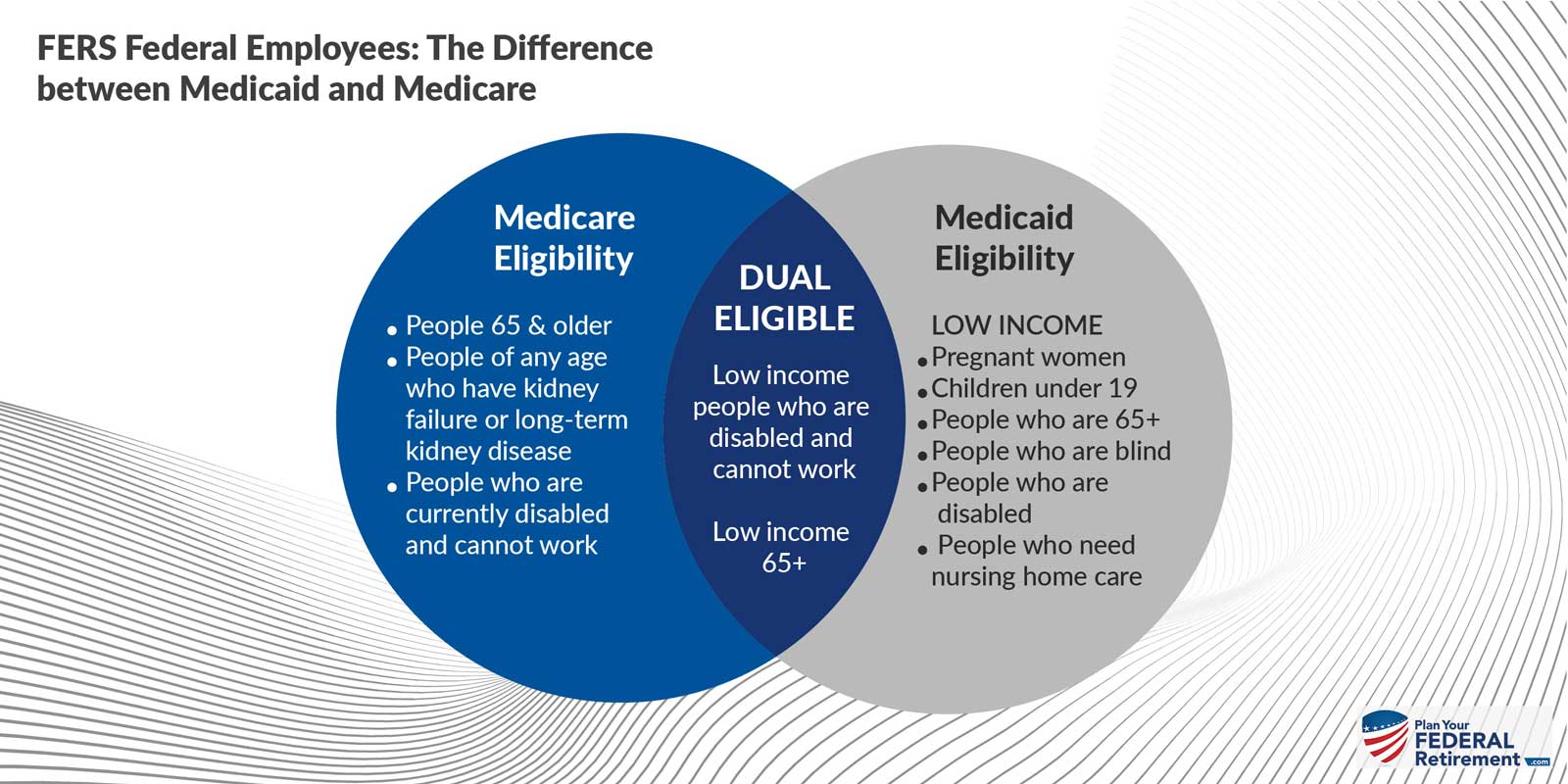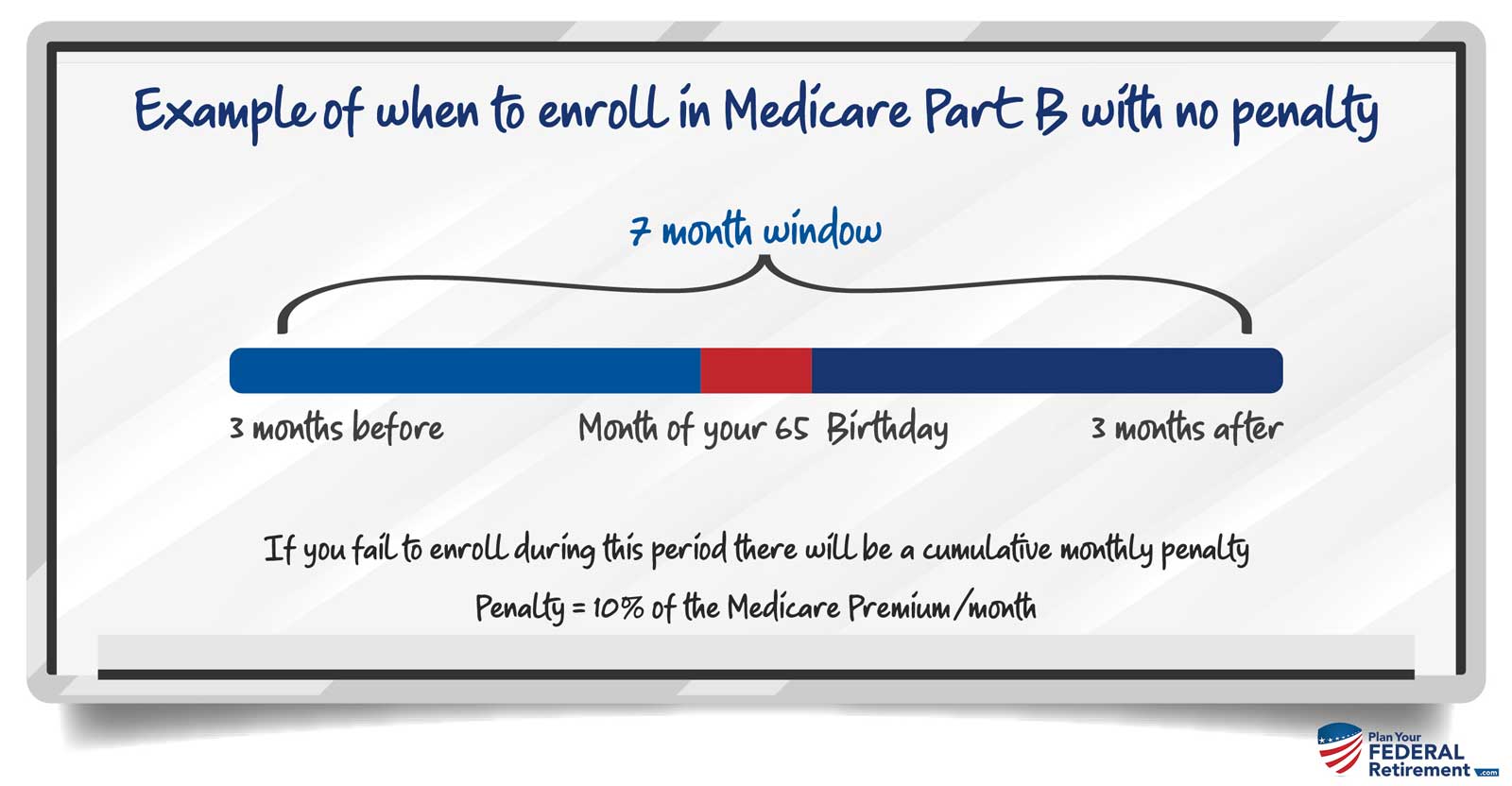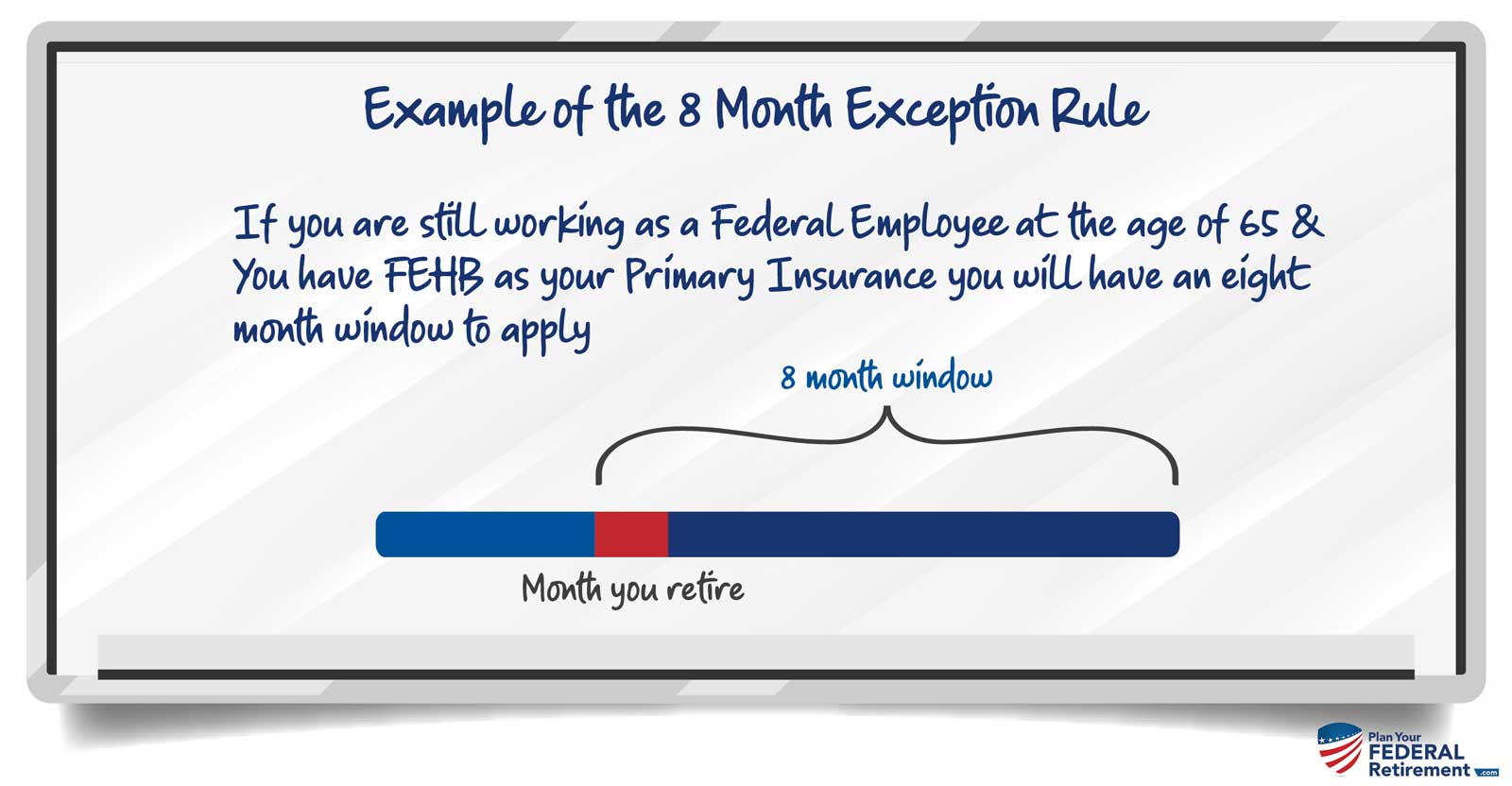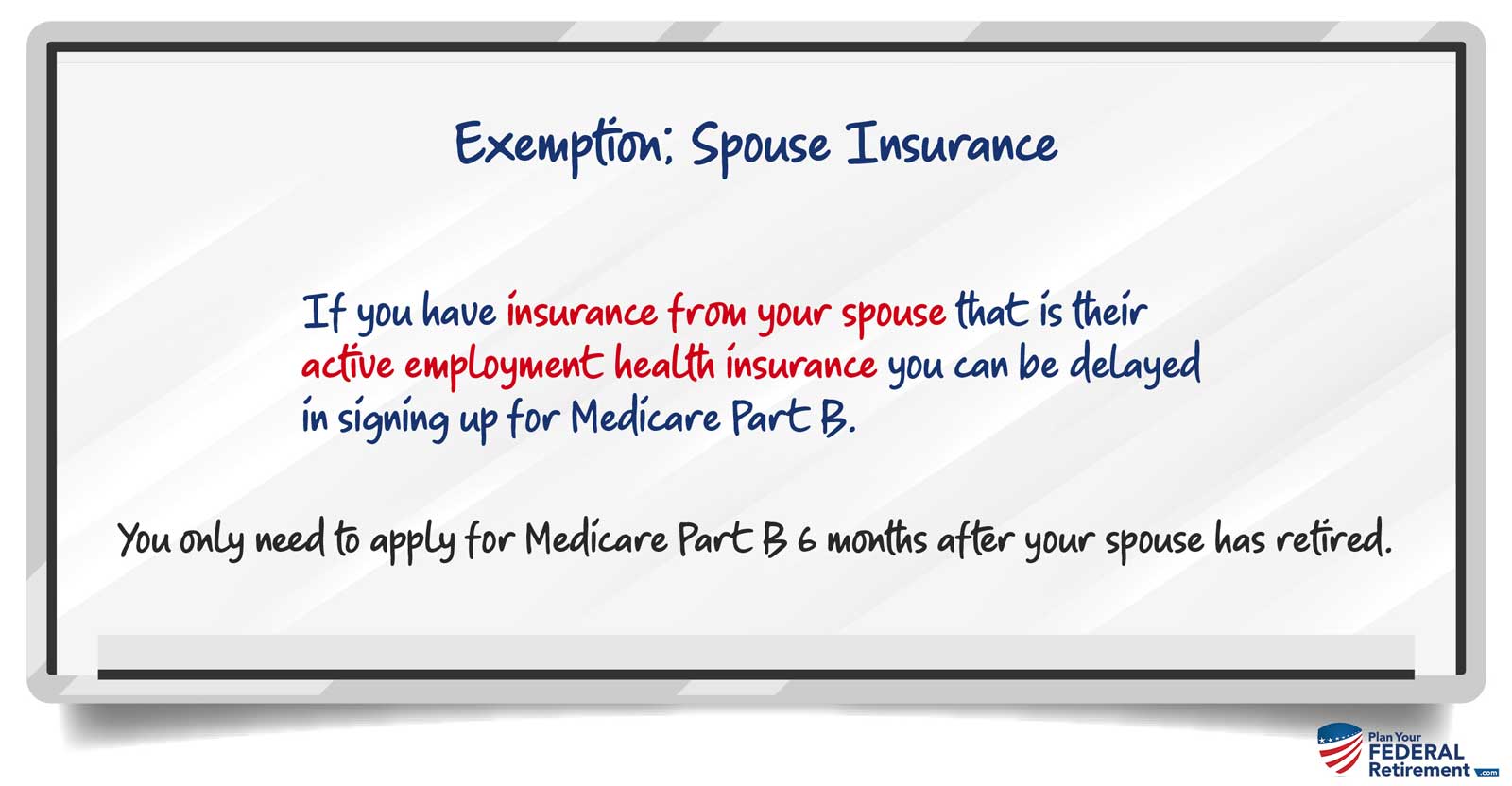We receive a lot of questions from Federal Employees about when they should enroll in Medicare. Medicare is a nationally run health insurance program for residents living in the United States. The program was first enacted in 1966 as part of the Social Security Administration offices services. However, today the Centers for Medicare and Medicaid Service agencies runs this program.
Medicare and Medicaid sound similar and both are national health insurance programs but these two programs, and what makes you eligible to participate in each, are not the same.
Some key differences to ensure that we understand the difference between both programs include:
Medicare provides health insurance for citizens as they reach age 65 and older. Alternatively, Medicaid provides health insurance for low-income citizens with special conditions resulting from events like pregnancy, being a minor, a disability, and those in need of nursing home care, amongst other events.
Medicare Enrollment begins at age 65.
When you enroll in Medicare at age 65, you will have the option to choose which “parts” of Medicare you would like to participate in. Several “parts,” named alphabetically, comprise Medicare and describe the line of coverage.
Medicare Part A (Hospital Insurance)
Part A covers inpatient hospital stays, care in a skilled nursing facility, hospice care, and some home health care.
Monthly Premium: When you reach age 65, you generally do not have to pay a premium for Medicare Part A Coverage. The reason that there is often no premium associated with Medicare Part A is that because, during your entire working career, you paid into Medicare. You paid 1.45% of your wages into Medicare and your employer did as well.
Enrollment: Not optional.
Medicare Part B (Medical Insurance)
Part B covers certain doctors’ services, outpatient care, medical supplies, and preventive services.
Monthly Premium: Most people pay for Medicare Part B Coverage. The premium that you pay is based on your wages. Contingent on your Adjusted Gross Income, the premium costs for Medicare Part B range from $135 to $460 a month.
Your Medicare Part B premium will be automatically deducted from your benefit payment if you get benefits from one of these:
- Social Security
- Railroad Retirement Board
- Office of Personnel Management
What is “IRMMA”: If your modified adjusted gross income is above a certain dollar amount, you may pay what is called “IRMAA” which is an Income Related Monthly Adjustment Amount (IRMAA) that Medicare assesses to your monthly premium for those earning over a certain threshold.
Medicare uses the modified adjusted gross income reported on your IRS tax return from 2 years ago. The IRS provides this information to the Social Security Administration offices and it reflects in your premium/coverage details accordingly.
Enrollment: Optional, but NOT REALLY OPTIONAL because of the penalties associated with not signing up on time.
You can sign up for Medicare Part B 3 months before your 65th birthday, during your birthday month, or 3 months following your birthday month.
You may enroll during this time period without penalty.
If you fail to enroll during this open enrollment period, then there is a 10% permanent penalty for every single year that you did not enroll in Medicare Part B and could have.
Exceptions: There is an exception to having to enroll in Medicare Part B, however.
If you meet these conditions:
- You are age 65 and still actively working. After you retire, you have an 8-month window to sign up for Medicare Part B.
- You are enrolled and are currently enrolled in FEHB which is your primary insurance.
- Your spouse actively works and their employer’s health insurance covers you.
Read more below to learn about the exemptions in greater detail.
Medicare Part C (Medicare Advantage)
Medicare Advantage (also known as Part C) is an “all in one” alternative to Original Medicare. These “bundled” Medicare Advantage plans include Part A, Part B, and usually Part D. If you sign up for a Medicare Advantage plan, that does not mean that you should unenroll in your FEHB benefits.
Premium: This varies significantly on the plan that you chose.
Medicare Part D (prescription drug coverage)
Part D adds prescription drug coverage to:
- Original Medicare
- Some Medicare Cost Plans
- Some Medicare Private-Fee-for-Service Plans
- Medicare Medical Savings Account Plans
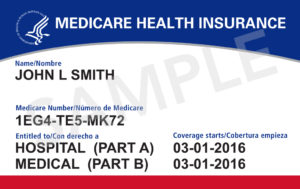
Do you still keep Federal Employee Health Benefits (FEHB) after you have enrolled in Medicare: Yes!
There are few circumstances in which discontinuing your FEHB insurance makes financial sense. When you enroll in Medicare, you still want to keep and maintain your FEHB.
Medicare Part B Exemptions
The rules always apply… unless they don’t of course. You have to enroll in Medicare Part B (an optional coverage) with 3 months of your 65th birthday, during the month of your 65th birthday, or within 3 months after your 65th birthday. However, there are some exemptions to this policy which we mentioned earlier.
- You are Age 65 and still actively working. After you retire, you have an 8-month window in which you must sign up for Medicare Part B and you are currently enrolled in FEHB which is your primary insurance.
- Your spouse actively works and their employer health insurance covers you.
Still Working at Age 65+ – Do you have to enroll in Medicare Part B?
If you are still actively working at age 65, you do not have to enroll in Medicare Part B as a Federal Employee as long as you are insured under FEHB. You can delay your enrollment in Medicare Part B until 8 months after your retirement date.
However, when you enroll in Medicare Part B during that 8-month window you must show proof of insurance coverage from during that time.
Tip: Before you separate from service, make sure that you get a letter from your Human Resource Department stating that you were actively enrolled under FEHB. You can get this letter after you retire, but it is generally a much faster process to receive it while you are still working.
I am Covered Under My Spouse’s Insurance. Do I Need to Enroll In Medicare Part B?
If you are age 65+ and have elected not to enroll in Medicare Part B, you could face a 10% premium penalty per year you delay enrollment with a few exemptions. One of those exemptions would be that you are currently enrolled in health insurance under your spouse’s employer health insurance program.
Here is an example:
Husband is a Federal Employee and he is age 65. Wife is a Federal Employee and she is age 59.
Husband has retired and is contemplating if he needs to enroll in Medicare Part B Coverage. Wife is actively working and enrolled in FEHB. The wife’s FEHB Plan covers both spouses.
Since the wife continued working longer than her husband, they wanted their FEHB coverage under the wife so that their premiums remain tax deductible during her employment. They both understand that once they both retire from Federal Service, their premiums for FEHB become taxable.
The wife really enjoys what she does and wants to continue to work until she has reached age 65 herself.
The date that the wife retires from active employment, she has an eight-month window to sign up for Medicare Part B.
Her husband, who is now age 71, has a 6-month window to sign up for Medicare Part B without penalty. The husband will need to show proof that he was covered under his wife’s FEHB Plan when he goes to sign up for Medicare Part B.
I am a Federal Employee who has Tricare. Do I still need to enroll in Medicare Part B?
Yes. Even if you are working and have FEHB coverage, Tricare requires that you enroll in Medicare Part B when you reach age 65.
Regardless of your employment status, Tricare Requires that you enroll at age 65 in Medicare Part B.




